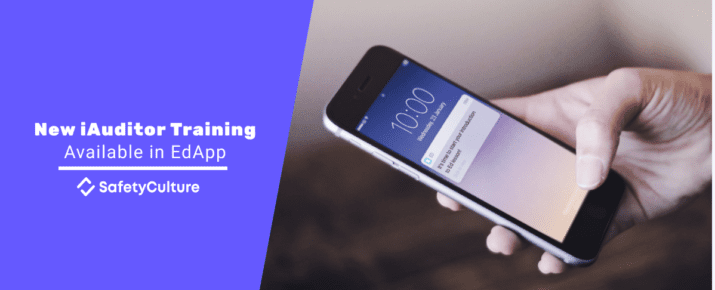Building COVID-19 resiliency with on-the-go checklists
iAuditor by SafetyCulture Tips | Tips & Tricks | By | 6 Nov 2020 | 3 minute read

Regardless of which industry you’re in, checklists are essential. From reopening a hair salon to taking stock of medical supplies in a surgeon’s theater, inspections help keep everyone feeling safe and secure.
Since COVID-19 unfolded, checks have taken a more central role in everyone’s lives. Maintaining clean spaces and observing social distancing means that compliance with these new measures is now of prime importance.
Paper-based checklists are no longer feasible since the pandemic took hold, for a number of reasons. Even if you’re a growing business, making the switch to digital inspection software will benefit your business in the long run.
Here’s why:
#1 Responsiveness and speed
Mobile apps increase the speed at which we do inspections. Being able to respond fast in a pandemic is critical, so that we can mitigate risk.
Digital inspection apps such as iAuditor give you the added advantage of assigning action items to individuals. With the ability to take photos and then tag a team member who is nearby, any issues that need fixing can be responded to at a moment’s notice.
This could be of real value to those in Hospitality. For example, a potential COVID-19 risk in a hotel bar could be identified during your inspection. An app like iAuditor could send critical action issues to team members, including those manning the reception desk, so they know to direct customers elsewhere whilst you sanitize the space.
#2 Hygiene and safety
Using a digital device such as an iPad or mobile to conduct checks and inspections is much more hygienic when keeping on top of cleaning standards. Being able to sanitize these devices each time can mean that risk of transmission is much lower.
Paper checklists can be misplaced, and are not as reliable. They’re also less environmentally friendly, requiring the need for storage and maintenance.
Digital checklists are stored in the cloud, meaning that they are encrypted and secure. Businesses can eliminate the need for physical cabinets and lockable drawers by uploading inspection records and checklists, which is useful as more businesses transition online.
Retail stores can benefit from this flexible approach to checks. As a huge amount of stock is circulated in any particular retail store, keeping it clean and hygienic can be an issue. Utilise a mobile app to conduct on-the-go audits of stock inspections, recording any concerns as you go.
#3 Reporting and data
The most important element of conducting inspections during COVID-19 is that you need to be sure that critical issues won’t happen again.
Tracking data over a period of time ensures that the analytics from digital inspection checklists are sound, and you can quickly view trends over time.
As checks get ever more frequent, saving time is another added benefit. Manually inputting inspection data from paper into an outdated online system can lead to errors, as well as costing businesses extra resource time.
Things can change at a moment’s notice with the pandemic, so you need to have data you can rely on. With real-time updates via iAuditor, communication and action items are accurate, unlike paper which can be out of date quickly.
Publishing your inspection data can also be a great way to build trust with your customers and show them that you’re doing everything you can to be safe and compliant.
When in a Manufacturing environment, it’s important to collect data on every aspect of operations. Manufacturing is a high-risk environment, and it’s important to keep your workers safe. By using a mobile app, you can keep records of staff health and temperature checks, knowing that you are mitigating the COVID-19 risk and putting wellbeing before production goals.
#4 Distributed information
Mobile checklists are perfect for a distributed workforce, meaning that users can stay up to date with inspection measures from the comfort of home.
With a team that is spread out nationally or even globally, sending live updates and checklist data can be sent to particular groups, selecting exactly those items that are relevant to a certain colleague or manager.
National or local lockdowns mean that inspection information is critical to share with other stores, branches and locations. If your teams can learn from each other in the ways they conduct inspections, manage risk and stay hygienic, then COVID-19 best practice can be accumulated and shared.
Logistics teams can have a challenge with a distributed workforce. Not only are drivers remote; they can be constantly moving around, meaning that on-the-go checklists are critical amidst the health risks of a pandemic.
Using a mobile device can allow you to train each of your operators to take responsibility for making sure their vehicle meets hygiene standards by scheduling frequent small checks that they can do on any on-person device.
COVID-19 checklists in your pocket
Protecting the health of your employees and customers is now the foundation of every business. On-the-go checklists can ensure that every member of your team takes responsibility for safety standards in your business, all at the touch of a button.
Having a range of COVID-19 checklists via a digital inspections app offers the most robust method to meet compliance guidelines and remain a safe, secure, and trusted brand.
Make the switch to iAuditor today and get the safety edge.
Check out our range of COVID-19 official checklists
Important Notice
The information contained in this article is general in nature and you should consider whether the information is appropriate to your specific needs. Legal and other matters referred to in this article are based on our interpretation of laws existing at the time and should not be relied on in place of professional advice. We are not responsible for the content of any site owned by a third party that may be linked to this article. SafetyCulture disclaims all liability (except for any liability which by law cannot be excluded) for any error, inaccuracy, or omission from the information contained in this article, any site linked to this article, and any loss or damage suffered by any person directly or indirectly through relying on this information.





